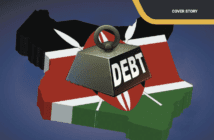The ability to think quantitatively is
essential for citizens of a democracy
By Nyatete Kenyanya
The world is full of numbers and the role played by numbers and data in contemporary society are virtually endless. An English author and historian, H.G. Wells, predicted more than one hundred years ago that quantitative reasoning would be necessary for effective citizenship. This, coupled with the study findings by the 2019 Nobel
Prize in Economics winners Abhijit Banerjee, Esther Duflo and Michael Kremer, in their novel experimental approach to tackling global poverty, should therefore be a revelation to African governments that continuously seek to fight the ever-rising poverty levels among their citizenry. The approach by the laureates, Teaching at the Right Levels (Tarl), which focuses on mathematics and reading skills for primary school pupils, is a deviation from the traditional approach to tackling poverty in developing countries of seeking foreign aid and requesting
for freeing up of trade. Their study was motivated by the realization that more than half of the pupils in the world (over 90% of them in the developing world) who leave the elementary levels of education lack concrete skills in mathematics and reading skills. This implies that school leavers in African countries lack quantitative reasoning which renders them unable to think quantitatively and analytically.
Quantitative reasoning is the numerical ability that equips people with the capacity to understand and explain their world in quantitative terms. With this ability, they are able to analytically interpret numerical data and evaluate arguments that rely on quantitative information and approaches. This is what is lacking in majority of the children who exit basic education institutions in many African countries. For example, a Kenyan Early Grade
Mathematics Assessment (EGMA) Baseline study of 2018 showed that a considerably high percentage of
pupils at class three in Kenya’s primary schools did not attain high order skills in mathematics. Moreover, 95.5% of the surveyed population did not attain competencies that required basic translation of information presented in sentences into simple arithmetic operations. It is important to note that these are Kenya’s future citizens who will, either directly or indirectly, be involved in decision-making in the increasingly competitive globalized world which is awash in numbers. The exponential rate at which quantitative information is being produced worldwide requires that every country which desires that its citizens deeply participate in public governance prepares them to think quantitatively.
Using science-backed evidence, the Nobel laureates demonstrated that Their study was motivated by the realization that more than half of the pupils in the world (over 90% of them in the developing world) who leave the elementary levels of education lack concrete skills in mathematics and reading skills. This implies that a big percentage of basic education school leavers in African countries lack quantitative reasoning which renders them unable to think quantitatively and analytically.
Numbers are everywhere. The population census and the decisions therefrom such division of revenue have more to do with numbers. The soaring public debt which currently stands at over KShs. 6 trillion deals with numbers. The repealed interest rate law, the ever-changing taxation policies, the Building Bridges Initiative (BBI) and its attendant repeals of the 2010 Kenyan Constitution, the formula for calculating the monthly fuel prices, and many more macro-economic measures deal with numbers. At the micro-economic level, there is an
increasing use of quantitative thinking in the workplace. For instance, accounting, which is a function that permeates all organisations, is basically quantitative. Every employee who has to make decisions concerning financial data needs to be suave in quantitative reasoning. Taxation, auditing, cost accounting and management
accounting are numerical tasks. Market research, human resource management and quality control are increasingly turning quantitative. Actually, numbers have become the chief instruments through which human beings attempt to exercise control over nature, over risk, and over life itself. A society whose citizenry is deficient in quantitative reasoning is therefore exposed to decision-making risk. This is why the Banerjee, Duflo and Kremer model of poverty alleviation focused on numerical skills.
Using science-backed evidence, the Nobel laureates demonstrated that there is a significant positive
correlation between quantitative reasoning and decrease in poverty. Interpreted otherwise, when citizens of any country have low quantitative reasoning skills, poverty levels increase. This is because quantitative reasoning
enhances the citizens’ ability to separate facts from opinions and then organize these facts in an appropriate manner in order to make decisions. Actually, lack of these skills has led to the fiscal participation apathy that is seen in most counties in Kenya during budget preparation due to the astronomical figures in the budgets. In most cases, for such citizens, breaking down the huge amounts of budgeted amounts leads to psychological surrender of the right to hold these county governments accountable. Consequently, comprehending the amounts involved in corruption scandals becomes an unsurmountable task for such a citizenry. Acting out of this defeat, the quantitative reasoning-deficient citizens then let the few informed but mostly corruptible leaders decide for them
how their finances will be appropriated.
It is apparent that the ability to think quantitatively is essential for citizens of a democracy, for it allows them to make informed decisions at home, in the workplace, and on complicated national and international issues that affect them and their local communities. Actually, the BBI report could be interrogated with profundity with a citizenry that will easily understand the reasoning behind the quantitative data therein, and the ramifications
therefrom. Being as it is, there is every chance that the report will be interrogated based on uninformed, science-deficient information-driven by political whims. Suffice to say, if individuals of a country lack the ability to think, evaluate and make decisions numerically, they cannot participate fully in civic life thereby bringing
into question the very basis of the government of, by, and for the people.
The watchdog groups such as professional bodies will do their part of analysing macro and micro economic data and informing the public in their endeavour to hold the governments accountable. The bodies, including the Institute of Certified Public Accountants (ICPAK), however, need to work with a quantitatively informed citizenry
for the analyses to make any meaningful sense. Making a detailed analysis of new tax policies for example, and presenting the information to a public that will still find it difficult to make any meaningful decisions out of it is, at best, chasing one’s tail. As such, it is imperative that ICPAK and other watchdog groups fight for a bigger
space in the development and implementation of the newly introduced Competency-Based Curriculum (CBC) in order to emphasize the need to focus on mathematics at the elementary level for every child as they seek to discover the individual talents of the learners. This will enhance citizen participation in governance which has a trickle-down effect on reducing poverty.
CPA Dr. Nyatete Kenyanya, PHD is a lecturer at Maseno University. [email protected]




